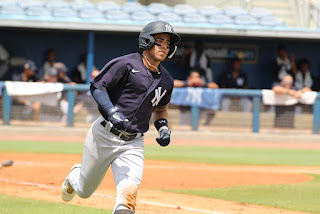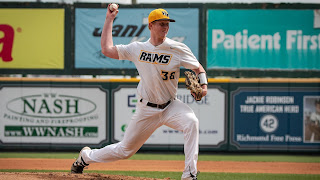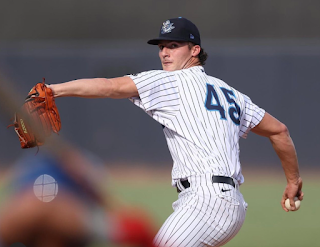The Todd Frazier dilemma
One of the common
sentiments among Yankees fans since the end of the season has been the desire
to sign Todd Frazier this offseason to keep him in pinstripes. Believe it or
not, the two alternatives of this decision form a complex and difficult conundrum
for the Yankees and actually could shape the entire offseason strategy for the
front office. Time to elaborate.
It starts
with simple question. Do we want to bring Todd Frazier back? Or not? The answer
actually has far reaching implications. This is possibly the most difficult
question to answer of all. There are many pertinent considerations.
Frazier is a
bit of a hometown hero, dating back to the little league world series in 1998
when he was the star of his team. They won the Little League World Series that
year. Fast forward 13 years and Frazier made his professional baseball debut
with the Reds. He has had a solid career over seven years. He has hit .245/.321/.459/.779
with 175 homeruns. This past season he hit .213/.344/.428/.772 with 27
homeruns.
After being
traded to the Yankees, he became popular with the fans and was a leader in the
clubhouse. He and Aaron Judge started the thumbs down craze, which was a crowd
favorite. His leadership had a positive impact on the entire Yankees team. Many
of the young players latched onto him and learned a great deal.
In the
playoffs, he came up with several clutch hits. He started and finished several
important rallies that helped get the Yankees where they were going. He was 8/43
throughout the playoffs with two doubles and a homerun. He also had four walks.
That gave him a .186/.239/.302/.541 line in the playoffs. As well liked as he
is, anyone looking at that stat line has to acknowledge it’s really bad. Let’s
call it what it is though, a small sample size against some of the best
pitching in the league.
It’s
important to note that this guy oozes leadership and charisma. From a clubhouse
perspective, they should keep him around for sure. Emotionally, most Yankees
fans would like to have him back. I played baseball against him all through
little league and high school (we are the same age). I would love to see him
continue to play for my favorite team.
He is an
above average defensive third baseman, he hits a bunch of homeruns, and has
accumulated a 22.0 WAR (wins above replacement) in his career. This past year,
he had a WAR of 3.4. Combine this with his longing to be a Yankee and the
leadership skills, and it’s safe to say you want this guy back.
There are,
however, reasons to reconsider that notion. The Yankees already have Chase
Headley at third, and Greg Bird at first. They have Gleyber Torres and Miguel
Andujar in the minors, and both look like they are ready for the big show.
Gleyber could be moved to second base, but they already have Starlin Castro
there. Signing Frazier without making another move would almost certainly block
Torres and Andujar from playing in the majors next year, and possibly beyond
(depending on the length of the contract).
The low
average is also frustrating. It’s no fun watching a guy strike out or hit pop
ups in key situations over and over again. Those types of guys can be rally
killers. He also has only had a couple of seasons where he had an OPS over
.800, and the most recent was all the way back in 2015.
The other
consideration is the opportunity cost. What does signing Frazier cost you in
terms of getting under the luxury tax threshold? What other players could you
have signed with that money that may have benefitted the team more? Does
signing Frazier prevent them from being able to sign a top notch starting
pitcher? These are all valid concerns.
With all of
this to consider, you start to see how complex this decision becomes, and how
it really does depend on how you approach the rest of the offseason.
Once you
have decided whether or not you want Todd Frazier on your team, you then have
to decide how you will approach the rest of your offseason.
If the
answer is yes, the first question that must be answered is the contract.
Personally, I don’t think you can keep Frazier on anything other than a one
year, hometown discount, prove yourself for next offseason type of contract.
There is a legitimate argument that he might go for that, especially with his
love for this area and the New York Yankees. I tend to believe it is rare that
you have a player who is this altruistic. Nor do I think they should be. I have
yet to meet the owner who wants to give away his money to make the players
wealthier, so why should the players do that for the already much more wealthy
owners? Most of the time, you will go where the money takes you. For Frazier, I
believe that money will be in the neighborhood of 3-5 years, $10-12 million per
year.
For the
record, if the contract is three years, $12 million, or 5 years, $10 million, I
am not interested. That said, an argument could be made that the Yankees should
go for it at three years, $12 million. This contract, in my opinion, would
block their excellent infield prospects for too long. They have players in the
minors who could be as productive as if not more than Frazier at less than 1/10th
of the cost. These are legitimate prospects too. One of them is widely
considered the top prospect in all of baseball (Gleyber Torres), and the other
is likely a top 100 prospect now (Miguel Andujar).
Assuming
that the Yankees want to sign Frazier, and are able to (regardless of the
cost), the next question is what to do about the rest of infield. One option would
be to do nothing else. This option would leave the Yankees with the same
infield they had in the playoffs. It begs the question of what to do with your
top prospects. The answer to that is quite simple. The Yankees have shown a recent
willingness to dump players who are not performing, no matter how big the
contract (see A-Rod). If Headley or Frazier doesn’t perform, dump them (this only
works if Frazier is on a one-year contract). If both are performing, and your
prospects are not ready, you stick with them. If both are performing, and your
prospects are ready, you trade one of them, go with your prospects, and DH the
other.
Another option
would be to trade either Headley or Castro. If you trade Headley, you still have
the space to move Frazier to the DH and play your prospect at third. If you
trade Castro, you could start Wade at second base at the beginning of the year
and then give Torres his shot when he is ready. This is a bit riskier, as you
could end up with Wade at second all year if Torres doesn’t prove himself
healthy and ready. If Wade is the guy he was last season, then this would be a
significant downgrade from Castro.
Ultimately,
having too many options at a given position is a good problem to have. Trading
from a position of strength is always something you can do. The $12 million it
would take to sign him wouldn’t put a huge dent in the luxury tax either. On
the other hand, if the money it takes to sign Frazier takes the Yankees out of
the starting pitcher market, then a Frazier reunion is not in the cards. Manipulating
the roster with trades could also make this signing work.
The decision
lies with Brian Cashman. I am not optimistic that there will be a match. If I
am Cashman, the only way I bring Frazier back is on a one-year deal to a
hometown discount. If I am Frazier, I don’t take that deal. Getting Frazier to
the right deal would be a good move for the Yankees. The only problem is, the
right deal is not likely to entice Frazier to stay in the Bronx.




Comments
Post a Comment